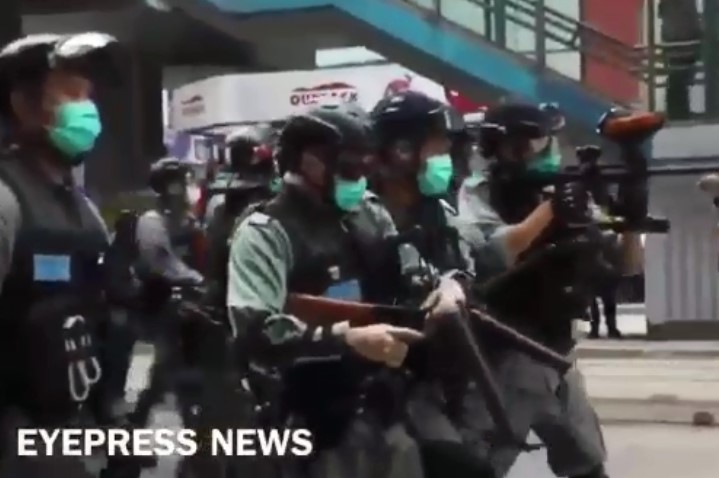Protestors have returned to the streets of Hong Kong following a proposal to introduce a new national security law announced last week. The law, which was presented before the National People’s Congress on Friday, would ban secessionist and subversive activity, as well as foreign interference, in the semi-autonomous Chinese territory.
https://twitter.com/HuXijin_GT/status/1264547320441364480
During the renewed outbreak of the months-long ‘pro-democracy’ protests, which began last year, the protesters set up road blocks and hurled umbrellas, water bottles and other objects, police said, adding that they responded with tear gas and made more than 120 arrests. A small group of so-called democracy activists protested outside Beijing’s main representative office in the city, chanting:
“National security law is destroying two systems.”
Hong Kong ‘democrats’ attacked and beat people that do not support riots. Additionally to the non-motivated violence towards ‘non-democratic’ city residents, the protests also drew a close attention of mainstream media outlets. In some cases, the numbeer of journalists covering the incidents between police and protestsers were larger than the number of protesters themselves.
https://twitter.com/HuXijin_GT/status/1264827383493713922
As the city government sought to give reassurances over the new laws, police conducted stop-and-search operations in Causeway Bay and warned people not to violate a ban on gatherings of more than eight. That restriction, imposed to contain the spread of coronavirus, has kept protesters largely off the streets in recent months.
The demonstrations reflect the concerns of some residents over the course of the “one country, two systems” formula that has governed Hong Kong since the former British colony’s return to Chinese rule in 1997.
As with last year’s protests, Western media and officials have been quick to condemn the Chinese government’s authoritarian and draconian actions, while Chinese officials have defended the new law and in turn accused Western countries of hypocrisy and meddling, emphasizing that the proposed legislation would target a narrow category of acts and would have no impact on the city’s autonomy and freedoms nor the interests of foreign firms.
Supporters of the Hong Kong protest like to compare the developments with the 1989 Tiananmen Square protests:
https://twitter.com/beomiology/status/1264814171771691010
Chris Patten, the last British governor of Hong Kong wrote in the Financial Times newspaper on Sunday (24 May) that Britain and its G7 allies should take a stance against Chinese President Xi Jinping’s “regime”, which he labelled “an enemy of open societies”, at the next G7 meeting in June. It could be noted that concerns over democracy were very low on the former governor’s list of priorities while Hong Kong was a British colony. Officials in Washington said on Sunday that China’s proposed legislation could lead to additional US sanctions.





Live ammo will definitely stop those protestors who are western supported traitors.
No need. If you arrest someone and detain them for several weeks that is enough deterrence for a resident, if they are a non-resident deport then after they serve their detention and ban re-entry.
That won’t happen because they could shot by mistake the masked mainlanders sent by the communist party to break windows.
These are orchestrated events staged by the 5 Eyes western nations who are engaged in a sustained campaign to destabilize, demonize and “contain” China.
China should offer 2% seats in their ruling body to people from and chosen by Hong kong. Problem solved.